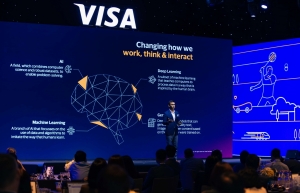Business and tech that will shape 2024
In 2024, businesses in Vietnam will have to grapple with how they can weave AI into their organisations effectively, whilst taking advantage of other emerging trends impacting the business landscape. There are some of the key business and technology trends that will open a new chapter for Vietnamese companies and the ways they can embrace them.
 |
| Bee Kheng, president of Cisco ASEAN |
AI will move from a “nice-to-have” to a “must-have” technology
The AI industry, expected to grow from $95.6 billion to $1.8 trillion by 2030, will be one of the main drivers of the global economy over the next decade. But companies are not yet fully ready to take advantage of this opportunity.
Cisco’s inaugural AI Readiness Index has found that only 27 per cent of organisations in Vietnam are fully prepared to deploy and leverage AI, with 84 per cent admitting severe concerns about the impact on business if they fail to act in the next 12 months.
The good news is that there is urgency to embrace AI and most companies have taken the first step. Almost all (99 per cent) organisations reported their company’s urgency to deploy AI-powered technologies has increased in the past six months. Ninety-nine per cent of organisations already have a robust AI strategy in place or are in the process of developing one.
However, considerable gaps exist across other key business pillars like infrastructure, data, governance, talent, and culture. As we welcome 2024 and the next waves of AI revolution, Vietnamese companies will need to wrestle with how to address AI across their organisations, not just from a technology perspective, but also among the humans who are ready, or not, to use that technology.
A movement for responsible, ethical AI will begin
AI promises transformative benefits but navigating its adoption is fraught with risks that demand organisations to have a strong framework of policies and protocols in place so as to guide the ethical and responsible management of data and AI systems.
While most organisations recognise the importance of AI governance, there is still room for improvement. Data privacy is a key risk, with only 35 per cent of respondents saying they have highly comprehensive AI policies and protocols in place. Bias is another, with less than a quarter (21 per cent) of organisations not having systematic mechanisms to detect data biases.
As AI’s impact grows, regulatory frameworks will continue to evolve, making it imperative for companies to stay updated on relevant local and international regulations and deploy timely, internal policies that address data privacy and security, and the responsible and ethical use of AI technology.
This includes implementing robust cybersecurity measures that consider potential vulnerabilities introduced by AI systems and continuous training and upskilling to ensure employees remain competent to handle risks. Companies building AI applications will have to think about embedding security, privacy, and trust by design processes throughout their innovation lifecycle and its application in products, services, and enterprise operations.
A new era of intuitive network infrastructure will emerge
As companies continue to capitalise on emerging technologies like AI to deliver their business outcomes, their digital infrastructure will play a more important role than they think. Building a modern and intelligent network will become an important part of companies’ growth as the scalability and integration of their networks with AI workloads or emerging technology could be the single differentiator in their success in leveraging AI and innovation.
Companies will realise the need for integrated security platforms that can provide end-to-end visibility for their organisations, especially when cybersecurity is becoming more complex in a multi-application and multi-cloud environment, and as employees work from different locations, use multiple connections, and access information across diverse platforms.
At the core, the network will play a crucial role in providing broad and deep visibility into every user, device, or entity that flows through the enterprise. This in turn allows it to be the sole control point to detect and remediate security threats and enforce security policies to contain the lateral movements of threats across the network and minimise the time needed to isolate threats when detected.
2024 will be a year of climate reckoning
With 2023 likely the hottest year on record, there is a critical need to limit the temperature rise to no more than 1.5 degrees Celsius to avoid catastrophic changes to the climate. As we get closer to that milestone, it will be increasingly clear that public-private partnerships are essential in creating a consistent and accurate way to measure progress, both within countries and industries and globally.
The demand for mandatory reporting will be a growing conversation as regulatory bodies step in to turn plans into concrete outcomes. Companies will face pressure to make progress on their sustainability journeys, with technology playing an important role in providing visibility and insights from the data centre to company premises to help them accurately measure their emissions and put together plans to create smart buildings and intelligent workspaces.
Receptiveness to change will remain core to success
As companies in Vietnam continue their digitalisation journeys, they must ensure that their talents keep pace with growth. While the technology industry continues to blossom, there remains a shortage of tech talent and demand is high. This presents a window of opportunity for organisations to develop future-ready tech professionals who are equipped with the necessary knowledge and skill sets to adapt to the evolving technology landscape.
This is where skills-to-job programmes like Cisco Networking Academy can help bridge the current tech talent gap. The programme has partnered with higher learning institutions to equip over 74,000 students in Vietnam with highly sought-after industry skills like cybersecurity, data science, and networking. It also aims to train 6.7 million people in Asia-Pacific in digital and cybersecurity skills by 2032.
Apart from cultivating a pipeline of talent, organisations also need to ensure that they foster the right culture that is rooted in purpose. We have seen first-hand how this has helped teams stay connected to each other and the company as they navigate a complex macroeconomic environment. This also helps to build stakeholder support and receptivity towards change as companies adapt to an ever-changing world.
 | AI can reshape Vietnam’s payment landscape Vietnam's payment landscape is set to undergo significant transformation through the use of generative AI, according to Visa. |
 | ASEAN, Japan to beef up AI, cybersecurity cooperation The Association of Southeast Asian Nations (ASEAN) and Japan are planning to work together on cybersecurity and systems for managing and operating artificial intelligence (AI), based on a draft plan on deepening their relationship. |
 | Vietnam keeping pace with world’s AI development: expert With the development of several language models designed specifically for Vietnamese users like PhoGPT, Vietnam has caught up with the world’s AI trend, an expert from VinAI under Vingroup conglomerate said on December 19. |
 | Thailand promotes AI application The Digital Economy and Society (DES) Ministry of Thailand has outlined its “quick wins AI & cloud policy” to promote artificial intelligence (AI) adoption and support domestic AI technology providers. |
 | Artists use tech weapons against AI copycats Artists under siege by artificial intelligence (AI) that studies their work, then replicates their styles, have teamed with university researchers to stymy such copycat activity. |
What the stars mean:
★ Poor ★ ★ Promising ★★★ Good ★★★★ Very good ★★★★★ Exceptional
Related Contents
Latest News
More News
- Masan Consumer names new deputy CEO to drive foods and beverages growth (February 23, 2026 | 20:52)
- Myriad risks ahead, but ones Vietnam can confront (February 20, 2026 | 15:02)
- Vietnam making the leap into AI and semiconductors (February 20, 2026 | 09:37)
- Funding must be activated for semiconductor success (February 20, 2026 | 09:20)
- Resilience as new benchmark for smarter infrastructure (February 19, 2026 | 20:35)
- A golden time to shine within ASEAN (February 19, 2026 | 20:22)
- Vietnam’s pivotal year for advancing sustainability (February 19, 2026 | 08:44)
- Strengthening the core role of industry and trade (February 19, 2026 | 08:35)
- Future orientations for healthcare improvements (February 19, 2026 | 08:29)
- Infrastructure orientations suitable for a new chapter (February 19, 2026 | 08:15)

 Tag:
Tag:


















 Mobile Version
Mobile Version